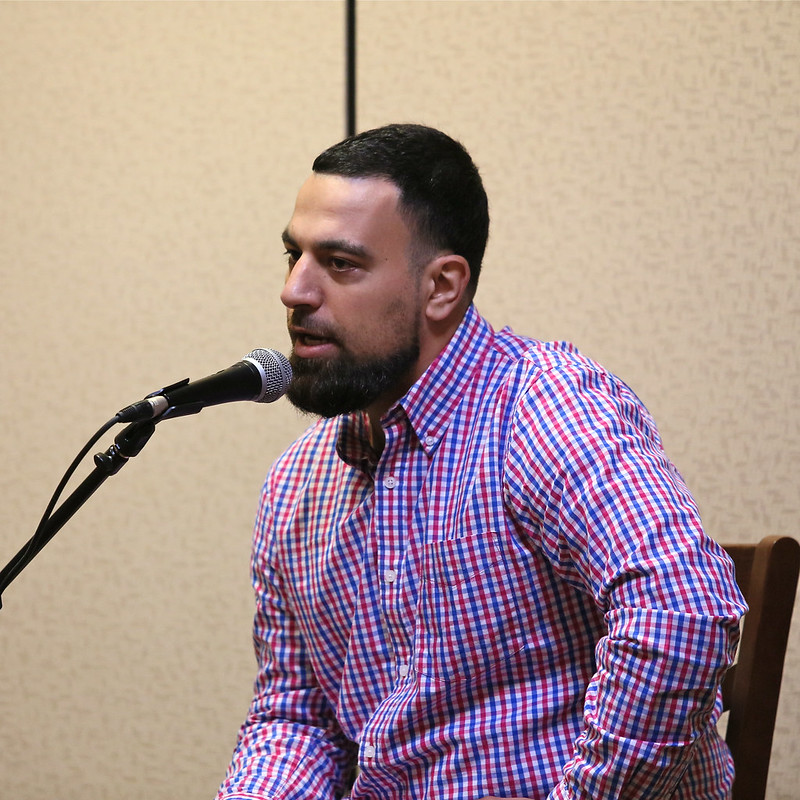
Two weeks ago, the University of Miami Law School welcomed a speaker who many Jewish students feel has a long history of anti-semitism.
Ahmad Abuznaid was invited by UM’s South/West Asian and North African Law Students Association chapter (SWANALSA). A flyer promoting the event was emailed to students and faculty across the law school. The flyer invited people to join their guest speakers in “fighting apartheid” and to come to a “Teach-in” hosted on March 18 at 6:30 p.m.
Abuznaid, a Florida Coastal School of Law graduate and member of the Florida bar, co-founded the Florida-based non-profit Dream Defenders, an organization founded after the killing of Trayvon Martin which promotes “transformative justice,” socialist ideals and defunding the police among other initiatives. In 2017, Abuznaid was named the director of the National Network for Arab American Communities. He is currently the executive director of the US Campaign for Palestinian Rights.
Internal emails by event organizers show the intention of the event was to “give Ahmad and Phil [Agnew] the opportunity to provide participants takeaways about what successful transnational movement building looks like.” Agnew, who spoke at the event, is also a co-founder of Dream Defenders.
The event became controversial when previous statements by Abuznaid soon began circling the internet, prompting a petition to cancel his appearance. In Abuznaid’s Instagram bio, he calls himself “Zaddy the Zionism Zlayer” and the “Palestinian Papi of Peace.” He also has worked with Boycott, Divest and Sanctions, a group deemed anti-semitic by the United States and the Anti-Defamation League.
On social media, Abuznaid has supported several controversial figures including posts praising terrorists Rasmea Odeh and Leila Khaled.
“The subject of Palestine is always controversial,” said Joubin Khazaie, a law student, member of SWANALSA and one of the event organizers. “Especially in South Florida where you have a very conservative Jewish presence.”
Joshua Bouchner, a third-year law student at UM and president of UM’s Cardozo Jewish Legal Society, brought his concerns to UM Law’s Dean of Students Janet Stearns prior to the event. The event organizers agreed to a set of guidelines for the potentially controversial event.
The guidelines included things such as “listen actively” and “speak from your own experience.”
“These are very real issues,” Bouchner said of Palestinian and Black issues. “They deserve to have their voices heard…I wasn’t against the event happening. I wanted it to happen in a way that didn’t target Jewish students.”
Bouchner explained that he was not in favor of cancelling the event, but had concerns about the hosts and brought it to Stearns. Emails provided by Bouchner corroborate his accounts of communication leading up to the event.
The event, which lasted an hour and a half, started off with Abuznaid giving a speech about his view of the history of the Israeli-Palestinian area.
“Zionism as a project has created a system of Jewish supremacy,” Abuznaid said. “In addition to utilizing imperialism, Israel used ethnic cleansing of Palestinians.”
Abuznaid, noted that the intention of the event was to discuss “Black revolutionaries’ connection to Palestine,” before proceeding to promote documents and books that aligned with his views.
The event left many Jewish students who attended upset.
“This particular event was completely one sided,” said Liza Weisman, a Jewish first-year law student. “It was just them pushing their political agenda.”
After Abuznaid’s speech and remarks from Agnew, the majority of time was taken up by audience questions.
“It was a very intimidating environment for any Jewish student to voice their opinion,” said Weisman, who asked a question during the event.
After discussing her family history of being the descendants of Holocaust survivors, she asked about differentiating between the Arab population that lives within Israel and those who live in the Westbank. She said she did not feel her question was answered and did not appreciate the setting of the exchange.
“When I asked my question…there wasn’t any effort to try and make this a neutral platform, it was just them trying to push their political agenda,” Weisman said.
Weisman also said she resented Abuznaid’s continued use of the words “apartheid” and “ethnic cleansing.” Over the course of the hour-and-a-half conversation, Abuznaid used a combination of those words more than 20 times.
Victor On-Sang, a SWANALSA member, one of the hosts and organizers of the event, declined comment for this article and instead said he wanted the focus of this article to be the impact the “teach-in had on the audience.”
“We ran a very good event,” Khazaie said. “I think considering the amount of build up of hostility, the event went pretty well.”
During the event, Abuznaid said he was willing to be called anti-semitic and embraced it, by saying he was there to be an “agitator.” He concluded the event by emphasizing the importance of listening to minority students and not defining what racism is to minority students.
Bouchner took note of this and said he wished Abuznaid would give Jews the same privilege.
“Over a dozen students have texted me and told me this is the best event they have ever been to,” Khazaie said.
Khazaie said he hopes to start a justice for Palestine group, ether within the law school or around campus.
On April 7, the Jewish Legal Society will be welcoming a speaker to discuss “the Jewish identity and defining anti-semitism.”
Featured photo by Bob Howard via Village Square on Flickr with a license found here.






